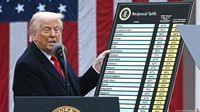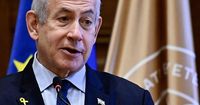In a press conference held in the Rose Garden of the White House on April 2, 2025, U.S. President Donald Trump unveiled a new round of global tariffs that has raised eyebrows and sparked controversy. His statements regarding the calculations, justifications, and anticipated effects of these tariffs were riddled with inaccuracies, prompting immediate backlash from various countries and economic analysts.
Among the most contentious claims made by Trump was his assertion that Canada imposes a "250-300% tariff on many of our dairy products." This particular statement, shared in a widely circulated video on social media platform X, has been fact-checked and debunked by multiple sources, including DW. According to the United States-Mexico-Canada Agreement (USMCA), the tariffs Canada places on U.S. dairy products are structured to allow a specific quota of U.S. dairy to enter Canada tariff-free. Once this limit is exceeded, the over-quota tariffs can indeed reach between 200% and 300%. However, the reality is that 99.9% of U.S. dairy products enter Canada without incurring these high tariffs, meaning that the likelihood of American producers facing such steep charges is minimal.
Bloomberg reported that, in practice, U.S. exporters have never come close to exceeding these quotas. The senior vice president of trade and workforce policy at the International Dairy Food Association (IDFA) confirmed this, stating that the U.S. has "never gotten close to exceeding our USMCA quotas." This detail highlights a significant discrepancy between Trump's claims and the actual trade dynamics between the U.S. and Canada.
Additionally, Trump reiterated a familiar assertion that the United States "took in hundreds of billions of dollars" due to tariffs imposed on China during his first term. However, experts clarify that while tariffs may affect foreign companies indirectly, the actual financial burden of tariffs falls on the importing businesses, which are often American.
Another misleading claim from Trump was regarding the European Union's tariffs, stating that the EU charges 39% tariffs on imports from the U.S. This assertion has also been fact-checked and found to be untrue. According to the World Trade Organization, the EU's trade-weighted average tariff rate is only 2.7%. The highest average tariffs that the EU imposes on certain products, such as dairy, can reach 30%, but this does not reflect the overall tariff landscape.
As part of Trump's new tariff policy, a "reciprocal" tariff of 20% on the European Union is set to take effect on April 9, 2025. Trump justified this move by stating, "Reciprocal. That means they do it to us and we do it to them... Very simple. Can't get any simpler than that." However, the calculations for these tariffs are based on a desire to balance trade deficits, as outlined by the Office of the U.S. Trade Representative.
In light of these developments, international reactions have begun to surface. Israeli Prime Minister Benjamin Netanyahu, who spoke with Trump about the new tariff policy, expressed concerns about its potential impact on Israeli exports. During a phone call on April 3, 2025, while visiting Hungary, Netanyahu raised the issue of a 17% tariff on unspecified Israeli goods exports to the United States. An Israeli finance ministry official indicated that this tariff could affect exports of machinery and medical equipment, raising alarms within Israel's trade sector.
Israel has long been a close ally of the United States, with a free trade agreement in place for 40 years, resulting in approximately 98% of U.S. goods being tax-free. However, the imposition of new tariffs could disrupt this long-standing economic relationship.
In a counter-response to the new tariffs, Israel had already taken steps to cancel its remaining tariffs on U.S. imports just two days prior, on April 1, 2025. This move underscores the complexities of international trade relationships and the ripple effects of unilateral tariff decisions.
The implications of Trump's tariff announcement extend beyond North America and Israel, as countries around the world are beginning to assess their own positions in light of potential retaliatory measures. Some nations have already indicated plans to implement countermeasures in response to the U.S. tariffs, leading to concerns about escalating trade tensions.
As the global economy continues to grapple with the ramifications of these tariffs, economists warn that such protectionist measures could lead to a slowdown in trade growth and increased prices for consumers. The interconnected nature of today's global economy means that tariffs can have far-reaching consequences, affecting not just the countries involved but also the consumers who ultimately bear the cost.
In summary, President Trump's new tariff policy has ignited a firestorm of controversy, with numerous claims being challenged by fact-checkers and economic analysts. As countries like Canada and Israel respond to these developments, the potential for escalating trade tensions looms large, raising questions about the future of international trade and economic cooperation.





